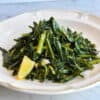 Did you know that you need fat to turn on your fat burning hormones, build lean muscle, feed your brain and optimize your health? If you’re eating a low-fat diet it is time to add some good fats into your daily meals. Not only will you feel better you will have less cravings for sugar and you will begin to lose weight.
Did you know that you need fat to turn on your fat burning hormones, build lean muscle, feed your brain and optimize your health? If you’re eating a low-fat diet it is time to add some good fats into your daily meals. Not only will you feel better you will have less cravings for sugar and you will begin to lose weight.
What is important to know is all fats are not created equally. Over the years you have been told canola oil, corn oil, soybean oil and vegetable oils are the “healthy” fats. Vegetable oils and margarine made from these oils were practically non-existent in our diets until the 1900’s when new chemical processes allowed them to be extracted. Since then we have seen heart disease and obesity rise. The truth is vegetable oil is not the health food that you were lead to believe it was.
Once I tell you how these foods are processed and how they react inside your body you will not want to eat them again. You will quickly see these are some of the most chemically altered and harmful foods in our diet.
1. Chemically Processed
Unlike butter or coconut oil these vegetable oils can’t be extracted just by pressing naturally, they have to be chemically extracted, deodorized and altered. This is how so called “healthy” vegetable oils are made, it isn’t pretty
- Pressing -The grains are pressed to extract some of the oils.
- Solvent Extraction – the grains are mixed with hexane and other industrial petroleum solvents to extract more oil from seeds.
- Boiling – Then another process of heat is used to remove nasty solids (wax) that occur during the first processing. It is heated to 212° F which causes the oil to oxidize.
- Bleaching and Degumming – The oil needs to be treated with more chemicals to remove the impurities.
- Deodorized – since the chemical process has created a harsh smelling oil, it must be chemically deodorized to be palatable. This is done with hot vapor at 450°
This article has fascinating videos contrasting the production of vegetable oils and butter.
2. Vegetable Oils Are Bad For Your Body
-
- Highly Inflammatory At the end of this process you get an oil that smells and tastes fine but what you are left with is a polyunsaturated fat that has been oxidized and is therefore VERY INFLAMMATORY inside your body. An oxidized oil produces free radicals inside your body which is the opposite of antioxidants. These free radicals cause you to age quickly. They damage your cell membranes, contribute to heart disease and other health problems.
-
- Causes Mutation of the Cells We are not designed to eat polyunsaturated fats. The fat content of our body is made up of 97% saturated and monounsaturated fats, and it needs these for optimal health. It does not make these fats, it can only use what we give it.
When we eat these highly processed polyunsaturated fats our body will use these fats instead of the saturated and monounsaturated fats it needs. The polyunsaturated fats are highly unstable and will enter into the cell walls. The cell walls are now made of up the both saturated and the polyunsaturated fats that can easily get oxidized in the body and cause mutation in the cells.
In the arteries, these mutations will cause inflammation which can lead to clogged arteries.
If the polyunsaturated fats get into our skin cells, the mutation of the cells can cause skin cancer.
- Causes Mutation of the Cells We are not designed to eat polyunsaturated fats. The fat content of our body is made up of 97% saturated and monounsaturated fats, and it needs these for optimal health. It does not make these fats, it can only use what we give it.
-
- Upsets the Proper Balance of Omega 3’s and 6’s Our body needs the proper ratio of Omega 3 and Omega 6 fatty acids 1:1 to maintain good health. Vegetable oils contain a very high concentration of Omega 6’s. Most Americans have too much of the omega 6’s from the oils we eat. Too much of these types of fatty acids tend to increase inflammation, blood clotting and the rapid cell growth of cancer. The omega 3’s on the other hand decrease inflammation and protect against cancer. This imbalance may explain the rise in heart disease, cancer, autoimmune disease and neurodegenerative disease which all come from inflammation in the body.The imbalance between omega-3 and omega-6 fatty acids may also contribute to obesity, depression, dyslexia, hyperactivity and even a tendency toward violence.
-
- Raises Your “Bad” Cholesterol Another way vegetable oils can inflict damage is by converting your good cholesterol into bad cholesterol-by oxidizing it. These oils raise your “bad” (LDL) cholesterol and lower your “good” (HDL) cholesterol because they contain trans fats (explained below). Also when you cook with polyunsaturated vegetable oils (such as canola, corn, and soy oils), oxidized cholesterol is introduced into your system.
3. Contain Trans Fats
The high pressure, high temperature process destroys all the “heart-friendly” fats originally contained in the oil and transforms it into dangerous trans fats. Trans fat are made by adding hydrogen to vegetable oil through a process called hydrogenation, which makes the oil less likely to spoil. According to a study by the University of Florida at Gainesville, even your NON-HYDROGENATED vegetable oil can still contain up to 4.6% trans fat that’s not on the label, nutrition facts or ingredients list.
- Nutrition Labeling Fact: In the United States if a food has less than 0.5 grams of trans fat per serving, the food label can read 0 grams trans-fat. Though that’s a small amount of trans- at, if you eat multiple servings of foods with less than 0.5 grams of trans fat, you could be putting your health at risk.
4. Made from GMO Grains
Vegetable oils are manufactured usually from genetically modified crops that have been heavily treated with pesticides. The majority of vegetable oil in our food is from soybeans and corn which in the United States are almost 100% GMO.

Basically, you want to avoid all vegetable oils, as well as margarine and other “fake butters”. These so called “healthy” vegetable oils are in a lot of foods you eat. They are in almost every prepared food you buy, including salad dressing, sauces, crackers, chips, cookies and the list goes on. Read every label as you will find them in things you don’t even expect like dried fruits. They are really harmful to your body. Here is a list of oils to avoid.
- “Vegetable” oil
- Canola Oil
- Corn Oil
- Cottonseed Oil
- Fake Butter
- Grapeseed Oil
- Margarine
- Safflower Oil
- Shortening
- Soybean Oil
- Sunflower Oil

There are lots of fabulous healthy oils that your body will benefit from. Here is a list you can eat regularly to promote good health:
Coconut Oil – It is full of Medium Chain Fatty Acids and Lauric Acid. This is the best oil for cooking as it does not oxidize easily at high temperatures or go rancid.
Butter – Really! Organic butter from pastured, grass-fed cows is an excellent source of healthy fat. It contains a compound that Weston A. Price called Activator X, known to improve nutrient absorption and have preventative benefits against disease. Don’t be afraid to have some butter,
Olive Oil – Extra virgin olive oil is high in monounsaturated fats and low in polyunsaturated fats. Olive oil is a great oil for salad dressings and cold recipes. If you cook with it keep the temperature on low as it is susceptible to oxidation at high temperatures. Always buy extra virgin olive oil in dark glass bottles as it will oxidize in the light.
Ghee -This fat has a very high smoking point and doesn’t burn easily during cooking. Ghee stimulates the secretion of stomach acids to help with digestion. Ghee is rich with antioxidants and acts as an aid in the absorption of vitamins and minerals from other foods, serving to strengthen the immune system. It has a high concentration of butyric acid, a fatty acid that contains anti-viral properties, is believed to inhibit the growth of cancerous tumors.
Avocado Oil – Although not commonly used avocado oil is a good cooking oil because it has a high smoking point (485º). Its high levels of monounsaturated fatty acids help to reduce harmful levels of inflammation in the body.
Flax Oil and Hemp Oil – Both flax and hemp seeds are rich plant sources of omega-3 fatty acids and other valuable nutrients. I like to use them as a supplement since they don’t taste good enough to use in dressings. They should never be heated and should be kept in the refrigerator.
In summary, vegetable oils slow down your fat loss and cause inflammation which leads to many health problems. Good fats speed up your fat loss and turn on your genes for good health.






So happy to read this. Have not used the oils on the bad list for a long time.
Do use most of what is on the good list. I ran across a site to make your own Ghee from store bought butter, do you suppose this is true.
Hi LynYou can definitely make ghee from store bought butter. Buy organic grass fed. Her is the link to my newsletter with directions how https://ui.constantcontact.com/rnavmap/emcf/email/create?copyUid=1109141699087to make it
For cooking, I love coconut oil, but there are certain foods that I do not want the coconut taste with. And depending upon the temperature, butter burns too easily.
So what type of oil do you recommend for cooking at med-high/high temperatures?
Hi Karen,
I would try using ghee for the high temperature cooking. Also the high heat coconut oils have less coconut flavor.
Hi, I am supersized to find Grapeseed Oil on your avoid list. I go to the trouble to buy certified organic, cold pressed Grapeseed oil. If the oil I buy is both certified organic and cold pressed, would you still consider it to be on your avoid list?
Hi Dan,
Thank you for asking such a good question. Grapeseed oil can be good when buying organic, cold pressed as long as you don’t use too much of it. The high amount of Omega 6 can lead to increased inflammation which leads to other problems in your body. The good thing about grapeseed oil is it has a higher smoke point than olive oil and doesn’t oxidize as quickly. Here is a good article on it from Dr Axe. https://draxe.com/grapeseed-oil/.